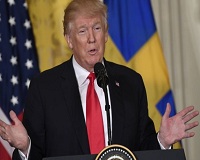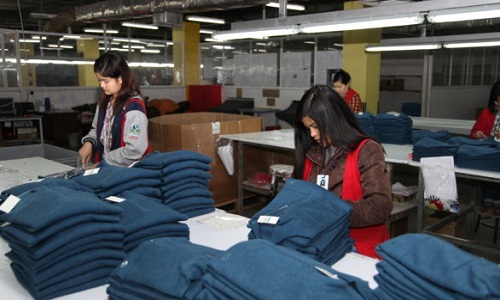"The world is concerned with President Trump’s tariff plans. The US has also announced 25 per cent tariff on steel imports and 10 per cent on aluminum for countries other than Canada and Mexico. Additionally, there are plans to impose around 45 per cent tariff on goods imported from China to suppress the country’s intellectual property problems. Companies will pay taxes at the border for the goods they are bringing in, which will make the products more expensive, and consumers have to pick up the tab. Apparel industry, already operating on razor thin margins for most goods cannot afford such high tariffs."

The world is concerned with President Trump’s tariff plans. The US has also announced 25 per cent tariff on steel imports and 10 per cent on aluminum for countries other than Canada and Mexico. Additionally, there are plans to impose around 45 per cent tariff on goods imported from China to suppress the country’s intellectual property problems. Companies will pay taxes at the border for the goods they are bringing in, which will make the products more expensive, and consumers have to pick up the tab. Apparel industry, already operating on razor thin margins for most goods cannot afford such high tariffs. Nicole Bivens Collinson, President-international trade and government relations, Sandler, Travis & Rosenberg feels the imposition of additional 35 to 45 per cent tariff on goods made in China will certainly impact prices.

The apparel and footwear industry is the latest to join the agitation over President Trump’s tariff plans on China. The move would lead to higher consumer prices. The US government is planning to impose tariff on Chinese IT, telecom and consumer goods with a view to force changes in China’s intellectual property and investment prices. Apart from a number of US retail giants, the American Apparel and Footwear Association (AAFA) and as many as 82 footwear companies have written to the President opposing the tariff.
Meanwhile, the apparel and footwear industry, particularly men’s and boys’ apparel wholesaling, has been growing steadily over the past five years and the momentum will continue in future as well. Additionally, consumer expenditure has risen on the back of a recovering economy, increasing consumer confidence, wage growth and higher purchasing power, which ultimately resulted in higher revenues for companies. Thus, it makes perfect sense to invest in apparel and footwear stocks.
Washington could impose more than $60 billion in tariffs on goods ranging from apparels to footwear, electronics and toys. Analysts feel any additional broad-based tariff means burdening the American working class as they will have to pay higher prices for household basics like clothing, shoes and electronics. There is a sense of caution among the entire US fashion industry. The imposition of 25 per cent and 10 per cent tariffs on imported steel and aluminum too will hit the apparel and footwear industry. Steve Lamar, Executive VP, AAFA points out imposing tariffs on imported items ultimately passes on to consumers. There is a direct cost that rolls into the industry. It is not like the can industry or the auto industry but it is there. Manufacturers, retailers and importers purchase trucks to haul merchandise and manufacturers package their goods in aluminum cans, he said.
Associations’ views
In a letter to President Trump, US apparel and retail organizations has said because duty rates in these product categories are so high and since China is a dominant supplier, imports from China account for most duties collected by the US government. In fact, duties on US imports of these consumer products from China already represent more than 22 per cent of all tariffs the US collects from all countries on all products. What’s more, such duties are paid by US workers, consumers, and companies—not China.
United States Fashion Industry Association (USFIA) has said while they support efforts to protect the IP of brands and retailers, they will never support punitive tariffs based on fiction that imports harm domestic jobs and growth. The new tariffs will not create more jobs in the US instead, will harm the companies that already create thousands of high-quality jobs in design, marketing, retail, logistics, compliance, within the US. These tariffs will surely harm American consumers, who will face higher prices on the clothes, shoes, home products, and other essentials.
It’s still too early to comprehend the future scenario. Bivens Collinson feels there is no way manufacturer or brands can absorb the high tariff. While the entire 35 per cent may not be added to the cost of an item, at least some may be added to the cost of apparel and footwear.












